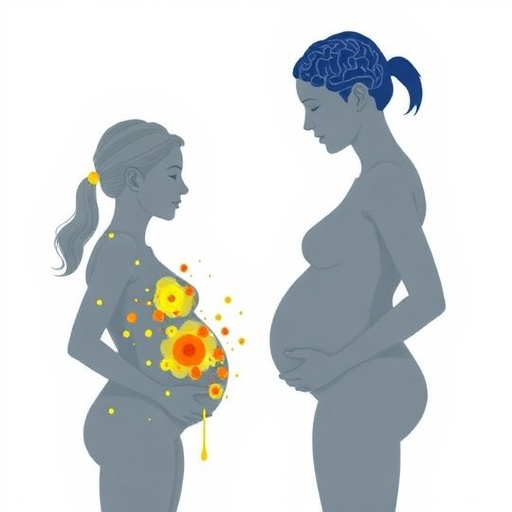In recent developments within the realm of perinatal mental health, a groundbreaking correction to a pivotal study has cast new light on the intricate interplay between depression, anxiety symptoms, and cognitive fusion during pregnancy. This refined investigation, published in the prestigious journal BMC Psychiatry, embarks on an in-depth network analysis that unravels the multifaceted relationships among these psychological constructs, highlighting the profound implications for maternal well-being and prenatal care.
Depression and anxiety represent two of the most prevalent mood disorders that afflict pregnant women globally, often co-occurring and contributing to complex symptomatology that poses significant challenges for diagnosis and intervention. The study in question employs sophisticated network analysis techniques, a methodological approach that departs from traditional linear models, to map the dynamic interconnections across individual symptoms rather than treating mental health conditions as monolithic entities. This paradigm enables a more nuanced understanding, acknowledging the heterogeneity and cross-symptom influences inherent in perinatal psychological distress.
Central to this research is the concept of cognitive fusion—a psychological process characterized by excessive entanglement with one’s thoughts, leading to a diminished ability to separate oneself from negative mental content. Cognitive fusion significantly exacerbates emotional suffering by amplifying the perceived importance and reality of distressing cognitions. By examining its associations with specific depression and anxiety symptoms among pregnant women, the study sheds light on potential mechanisms that might underlie symptom maintenance and escalation during this critical life period.
The corrected findings underscore how particular dimensions of cognitive fusion intertwine with clusters of depressive and anxious symptoms, suggesting that certain cognitive processes act as hubs within the mental health symptom network. This revelation is crucial from both a theoretical and clinical perspective, as it offers concrete targets for psychological interventions—especially those rooted in third-wave cognitive-behavioral therapies such as Acceptance and Commitment Therapy (ACT), which focus explicitly on cognitive defusion techniques.
Interestingly, the network topology revealed by this analysis points to certain symptoms exerting disproportionate influence across the network. These “central” symptoms potentially serve as drivers within the psychopathological system, and cognitive fusion appears to act synergistically, reinforcing these core symptoms and thereby perpetuating distress. Recognizing these intricate pathways is indispensable for designing precision mental health strategies that disrupt maladaptive cycles and foster resilience in pregnant populations.
Pregnancy constitutes a uniquely vulnerable window during which neuroendocrine shifts, psychosocial stressors, and pre-existing vulnerabilities converge, precipitating or exacerbating mood disturbances. The study’s refined analysis contributes to this knowledge base by elucidating how interrelated symptom networks manifest amidst such biological and environmental flux, emphasizing the importance of holistic assessment methods that transcend categorical diagnostic boundaries.
Furthermore, the research highlights that symptom networks in pregnant women may differ fundamentally from those observed in the general population, reflecting the distinct psychological milieu shaped by gestational changes and anticipatory concerns. Such differentiation accentuates the necessity for tailored screening tools and therapeutic approaches that resonate with the lived experiences of expectant mothers.
The methodological rigor applied in this corrected study involves advanced statistical modeling that incorporates robustness checks and network comparison metrics, thereby enhancing the reliability and validity of the observed symptom interrelations. These technical enhancements address prior analytical oversights, ultimately refining our comprehension of the mental health landscape during pregnancy.
Moreover, this paradigm shift towards symptom-level analysis carries implications beyond research, potentially transforming clinical practice by advocating for individualized care plans that zero in on symptom targets most central to a given patient’s network configuration. This move promises to augment treatment efficacy and optimize resource allocation in maternity mental health services.
Concomitantly, the identification of cognitive fusion as a pivotal factor introduces new avenues for psychoeducational initiatives aimed at improving cognitive flexibility and meta-cognitive awareness among pregnant women. Empowering individuals with skills to disentangle from distressing thoughts may mitigate symptom severity and enhance overall psychological functioning.
In a broader context, the study’s findings emphasize the interconnectedness of cognitive and affective domains in perinatal psychopathology, inviting interdisciplinary collaboration among psychologists, obstetricians, and mental health practitioners. Such integrative efforts are quintessential for advancing maternal health outcomes, minimizing adverse perinatal effects, and promoting infant development.
As the field moves forward, the correction issued on this article serves as a testament to the evolving nature of scientific inquiry—reflecting both the complexity of mental health phenomena and the commitment to methodological excellence. Continued exploration of network approaches promises to yield deeper insights and foster innovative interventions tailored to vulnerable groups such as pregnant women.
Ultimately, this refined network analysis beckons a paradigm wherein mental health is viewed as a dynamic system influenced by cognitive, emotional, and contextual factors. By decoding these intricate patterns, researchers and clinicians can better anticipate symptom trajectories and craft interventions that not only alleviate suffering but also nurture psychological resilience throughout pregnancy and beyond.
Subject of Research: Network analysis of depression and anxiety symptoms and their associations with cognitive fusion among pregnant women
Article Title: Correction: Network analysis of depression and anxiety symptoms and their associations with cognitive fusion among pregnant women
Article References: Liu, H., Huang, F., Gao, Y. et al. Correction: Network analysis of depression and anxiety symptoms and their associations with cognitive fusion among pregnant women. BMC Psychiatry 25, 771 (2025). https://doi.org/10.1186/s12888-025-07204-5
Image Credits: AI Generated




